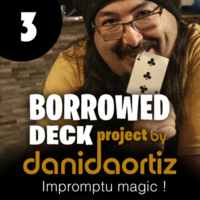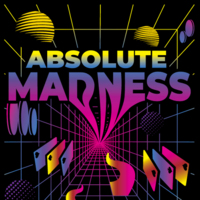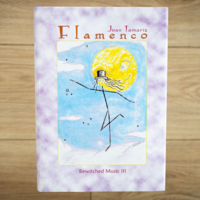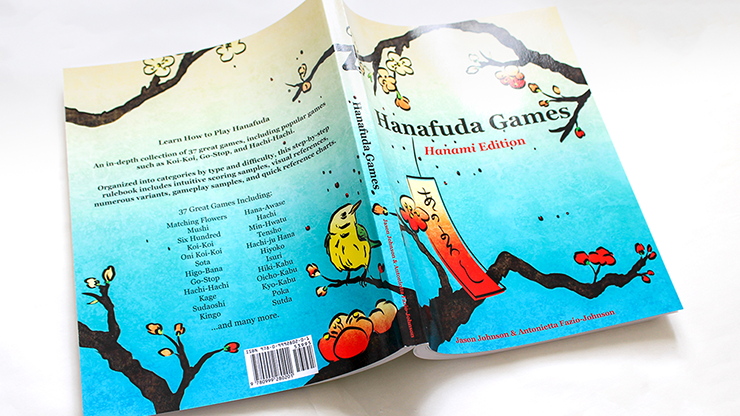Hanafuda Games Hanami Edition
| List price: | |
| Price: | $34.61 |
| You save: | $10.34 (23%) |
Out of stock.
This product has been discontinued. If you are the manufacturer of this item please contact Penguin to help us re-stock.
Learn how to play Hanafuda!
Hanafuda Games Hanami Edition is an in-depth collection of 37 great games, including popular games such as Koi-Koi, Go-Stop, and Hachi-Hachi.
Organized into categories by type and difficulty, this step-by-step rulebook includes intuitive scoring samples, visual references, numerous variants, gameplay samples, and quick reference charts.
This book features the art of the Hanami deck series. The Hanami decks are available in Hanafuda and Fusion formats.
Rulebook features:
- 37 games
- 236 pages
- Full-color
- 70# paper
- 8.5" x 11" x 0.6"
- Perfect bound
- Quick reference charts
- Scoring samples
Capture Games are the most popular Hanafuda games. Capture games involve capturing cards from a field and creating yaku (special combinations of cards) to score points.
- Simplified Game for Beginners (Absolute Beginner, 2-4 players)
- Matching Flowers (Beginner, 2-3 players)
- Hana-Awase 1 (Beginner, 3-4 players)
- Hana-Awase 2 (Beginner, 3 players)
- Mushi (Beginner, 2 players)
- Six Hundred (Beginner, 2-3 players)
- Hachi-juu Hana (Beginner, 2-3 players)
- Min-Hwatu (Intermediate, 2-3 players)
- Koi-Koi (Intermediate, 2 players)
- Oni Koi-Koi (Intermediate, 2 players)
- Higo-Bana (Intermediate, 2-7 players)
- Tensho, simplified (Intermediate, 2 players)
- Go-Stop (Expert, 2-7 players)
- Hachi-Hachi (Expert, 2-7 players)
- Sudaoshi (Expert, 3 players)
- Hachi, simplified (Expert, 2 players)
- Hachi (Expert, 2 players)
- Tensho (Expert, 2 players)
- Poka (Beginner, 2 players)
- Hiyoko, simplified (Beginner, 2-4 players)
- Isuri, simplified (Beginner, 2-3 players)
- Kage (Beginner, 2 players)
- Hiyoko (Intermediate, 2-4 players)
- Isuri (Intermediate, 2-3 players)
- Sutda, simplified (Beginner, 2-10 players)
- Hiki-Kabu (Beginner, 2-10 players)
- Oicho-Kabu (Beginner, 2-10 players)
- Kyo-Kabu (Beginner, 2-10 players)
- Kingo (Beginner, 2-10 players)
- Sota (Intermediate, 2-6 players)
- Sutda (Intermediate, 2-10 players)
- Seasons (Beginner, 1-4 players)
- Pyramid (Beginner, 1 players)
- Solitaire (Intermediate, 1 players)
- Eight Off (Intermediate, 1 players)
- Hana-Rumi (Intermediate, 2-4 players)
- Hana-Gin (Intermediate, 2-4 players)
Have a question about this product?
ASK HERE
ASK HERE
Featured Magic Tricks
Customer Reviews (showing 1 - of 1)
5 star 100%
4 star 0%
3 star 0%
2 star 0%
1 star 0%
4 star 0%
3 star 0%
2 star 0%
1 star 0%

 The single best book available with English rules for games with Hanafuda playing cards
Report this review
The single best book available with English rules for games with Hanafuda playing cards
Report this review
Pro Privacy ON
(login to see reviewer names)
on August 7th, 2018
(This review is for Hanafuda Games Hanami Edition)
The two people behind IndianWolf Studios, the husband and wife team of Jason and Antonietta Johnson,
have created a wonderful rule-book as part of two project that also included the creation of two
custom decks of Hanafuda playing cards, the Hanami edition and the Sensu edition. Apparently rules
for Hanafudu games can be hard to find or interpret, so IndianWolf Studios has done the hard work
for us by putting this material together into a lovely book, which is available as a hard copy or as
an eBook.
It's an impressive full-colour 236 page book, and contains a collection of 37 different games organized into sections for four main types of games: Capture Games, Sequence Games, Luck Games, and Fusion Solitaire Games. Within each section the games are arranged by difficulty, using a handy color code. A final section at the end of the book contains handy Quick Reference Charts, which help out with scoring. Within the explanations themselves are game-play and scoring examples, pictures, and variants.
Some of the Fusion Games will be immediately familiar to anyone who has some experience with Western card games, such as the three solitaire games Pyramid, Solitaire, and Eight Off, while games like Hana-Rumi and Hana-Gin have obvious parallels with the counterparts that inspired them: Rummy and Gin. But these are mainly designed to get people familiar with the Hanafuda deck. And it is really the Hanafuda games in this book that are of special interest.
The Luck Games are good for social settings, and are fast and fun, whereas the Sequence Games require you to empty your hand and have a more serious and thoughtful feel to the game-play. But what people will especially find interesting is the Capture Games category, where game-play revolves around capturing cards from a field and creating point-scoring combinations. This style of gameplay is reminiscent of traditional and popular card games like Scopa and Cassino.
If you are starting from scratch, I'd recommend beginning with the Simplified Game for Beginners and with Matching Flowers, to familiarize yourself with the cards. Then eventually work yourself up to the classic and popular Japanese two player game Koi-Koi. When you're ready for it, give the more complex 2-7 player game Go-Stop a try, because this is arguably the most popular game played with Hanafuda cards in Korea. Higo-bana is a version of Hanafuda that is very popular in Hawaii, and is also included in the book, and can be recommended.
The beauty of a good rulebook like this one, is that it is a terrific resource that really helps people with a Hanafuda deck get started in exploring this new world of possibilities. An excellent volume that I highly recommend to anyone interested in games that can be played with Hanafuda playing cards. - BoardGameGeek reviewer EndersGame
It's an impressive full-colour 236 page book, and contains a collection of 37 different games organized into sections for four main types of games: Capture Games, Sequence Games, Luck Games, and Fusion Solitaire Games. Within each section the games are arranged by difficulty, using a handy color code. A final section at the end of the book contains handy Quick Reference Charts, which help out with scoring. Within the explanations themselves are game-play and scoring examples, pictures, and variants.
Some of the Fusion Games will be immediately familiar to anyone who has some experience with Western card games, such as the three solitaire games Pyramid, Solitaire, and Eight Off, while games like Hana-Rumi and Hana-Gin have obvious parallels with the counterparts that inspired them: Rummy and Gin. But these are mainly designed to get people familiar with the Hanafuda deck. And it is really the Hanafuda games in this book that are of special interest.
The Luck Games are good for social settings, and are fast and fun, whereas the Sequence Games require you to empty your hand and have a more serious and thoughtful feel to the game-play. But what people will especially find interesting is the Capture Games category, where game-play revolves around capturing cards from a field and creating point-scoring combinations. This style of gameplay is reminiscent of traditional and popular card games like Scopa and Cassino.
If you are starting from scratch, I'd recommend beginning with the Simplified Game for Beginners and with Matching Flowers, to familiarize yourself with the cards. Then eventually work yourself up to the classic and popular Japanese two player game Koi-Koi. When you're ready for it, give the more complex 2-7 player game Go-Stop a try, because this is arguably the most popular game played with Hanafuda cards in Korea. Higo-bana is a version of Hanafuda that is very popular in Hawaii, and is also included in the book, and can be recommended.
The beauty of a good rulebook like this one, is that it is a terrific resource that really helps people with a Hanafuda deck get started in exploring this new world of possibilities. An excellent volume that I highly recommend to anyone interested in games that can be played with Hanafuda playing cards. - BoardGameGeek reviewer EndersGame
Did this review help you?
Do you want to respond to this review?














































